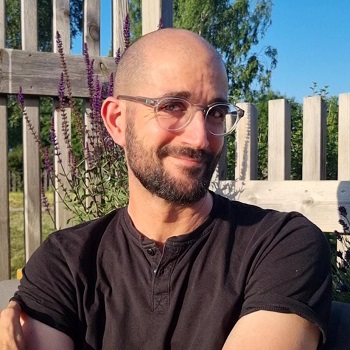Carlos Casanueva Perez talks about the strategic educational development program at KTH

Anna Burvall, Carlos Casanueva Perez, Roy Skjelnes and Martin Viklund were selected to participate in a development-oriented and meritorious program for skilled teachers at KTH ( learn more about the Program here ). Carlos Casanueva Perez talked to us about his background and his participation in the program.
Tell us a bit about yourself.
My pronouns are He/Him, I'm associate professor in Rail Vehicles Technology at the Engineering Mechanics department, and I do research mainly about the dynamics of vehicle-track systems. I teach rail vehicles related courses and lectures, mostly at Master level, but also a little on equality and diversity in research environments. I am also part of the leadership team at the Centre for ECO2 Vehicle Design, and Program Director for the 5-year degree program in Vehicle Engineering (Farkostteknik CivEng); I was Program Director of the international Master Program in Railway Engineering until July 2022.
I studied industrial/mechanical engineering back in Spain (in Donostia-San Sebastian, lovely place and even better food), and did my PhD on the dynamic behaviour of variable gauge wheelsets (one of these: en.wikipedia.org/wiki/Variable_gauge ). Then ended up at KTH Rail Vehicles group as a postdoctoral researcher, and was lucky enough to land this tenure track gig! Stockholm is also a lovely place, but the food is not that good compared to the Basque Country...
At a more personal level, I enjoy the regular stuff (reading nice books and watching nice films and series, traveling...), plus board games and mushroom hunting when in season. I was diagnosed as an adult with ADHD Inattentive Type, so I feel pretty lucky being where I am in my life and career!
What are your principles when it comes to teaching or performing other pedagogical activities?
I would say I ground my own pedagogic activities in an overly enthusiastic approach to teaching and learning, being supportive and close to the students, and a systematic continuous development of my courses and activities. I am always open to modifying significant bits of a course from year to year, and I put an extra effort on showing students what we did for them as course development based on the feedback from former students. Then I highlight those points once more at the end of the course to try to increase the participation in the Learning Experience Questionnaire; I sometimes still get a rather bad answer rate in the LEQ, but it usually works well! I enjoy doing this in a collegial way too, discussing it with colleagues and contributing to other courses' development if possible.
What drove you to apply to the program?
After the first pedagogical course I took at KTH I have been more and more interested in education and pedagogy, and I would love to have a balanced work-life when it comes to research and education. When I heard about the program I had already discussed becoming Program Director of the 5-year degree program in Vehicle Engineering, so it was a unique opportunity to develop my skills and have a bigger impact as Program Director.
What are you planning to do through your participation in the program?
I am gathering information about what the Vehicle Engineering students do before and during their first year at KTH, academic or otherwise. Then the plan is to cross-correlate those with the activities and attitudes known to have an impact on student performance and persistence, both from previous KTH experiences and from pedagogic literature. Some things I think are interesting are for example the activities that engage them with faculty, or how their social and geographical background before KTH shapes their year 1 activities - and thus all their studies afterwards.
It has not been easy to define what my project was exactly. The overarching theme and initial proposal was around our willingness to create a continuous development process for the 5-year program, heavily rooted in a collegial approach. But that is a huge project, and we are working on this as we speak. At some point then my interests forked in two distinct directions: I could look into the organizational side, the creation of a collegial "grassroots" movement for continuously improving and developing the program based on the most active actors - course responsibles, program administrators, and students; or I could go into understanding the student base for the 5-year program and what do they need for successfully tackling course after course until becoming fully fledged engineering graduates. I chose this second one, focusing on the freshman year as the most formative year of their studies. I think that in the end it will become an emergent project from all these different parallel works, we'll see where we land!
Questions: Danai Deligeorgaki

